Simon Element
With the support of the publisher, Shelf Awareness presents three upcoming titles from Simon Element, with excerpts showing how their ideas will help readers lead healthier, more fulfilling lives.
With the support of the publisher, Shelf Awareness presents three upcoming titles from Simon Element, with excerpts showing how their ideas will help readers lead healthier, more fulfilling lives.
Simon Element, an imprint of Simon & Schuster founded in 2021, publishes books addressing topics that are foundational to how we live—from the meals we eat to the relationships we nurture, the households we manage, and the personal and professional goals we set and strive to achieve. Simon Element books provide information, advice, and inspiration in visually dynamic forms from authorities with original ideas and deep expertise to guide readers on their path through life.
We're excited to share brief excerpts from a selection of exciting Simon Element titles coming soon in 2024.
The Life Brief: A Playbook for No-Regrets Living by Bonnie Wan ($27.99, 9781982195502, January 16, 2024).
.jpg) LET'S BE BRIEF
LET'S BE BRIEF
What do you want?
It's a simple question, right? We ask it all the time, when deciding what to eat, how to spend our day, or what we'd like for our birthday. But that's not what I'm asking.
I'm not asking, what are you in the mood for, or what do you think you want? And I'm definitely not asking, what do your parents, your partner, or your friends want for you.
What I'm asking is this: In your heart of hearts, what do you really, really want? What do you want in your life that you haven't even admitted to yourself?
This is the driving question of the Life Brief.
What Is a Life Brief?
The most important tool used by every strategist and creative agency is what's known as a "creative brief." This single-page, single-minded document concisely yet vividly captures a company's essence and ambition. Great briefs distill complex problems into sharp and sticky strategies that focus our attention, unlock solutions, and inspire action.
When drafting creative briefs, strategists use questions to guide, if not force, clarity about the essential building blocks of a brand. The flow of these questions on a single page pushes you to connect the dots and culminates in a single-minded strategic idea for a company's future direction.
The Life Brief is, at its simplest, a creative brief for your life.
But because you're not a brand, the Life Brief doesn't follow the same format as the creative briefs we write for brands. What we're aiming for here are five clear, bold, declarative statements about what you want in the areas of your life that matter most, summed up in a sharp and sticky phrase that you can use to guide your decisions and drive your actions.
This sounds simple, but it's a transformative process. In order to get to statements that are focused, specific, and above all, penetratingly honest, we first need to go wide—with warm-ups, exercises, reflective prompts, and questions designed to unlock your curiosity, creativity, and clarity.
Ultimately, the Life Brief is a practice of alignment between who you are, what you believe, and how you live—one that begins with that crucial question:
What do you really, really want?
If you cringe at the question or find it off-putting, that's okay.
I've been there myself, resisting anything that smells of or signals self-help.
But here's what I've learned. If we never allow ourselves to ask and honestly answer this simple question, we run the risk of never getting what we want. If we don't check in with ourselves about our own dreams and desires, we might end up following someone else's plans, feeling con- fused about our own, or lost as to why we're feeling unfulfilled.
Applying this practice to my life has deepened and saved my marriage (not once, but twice), centered my parenting, and propelled my career far beyond what I could have imagined. It's helped me turn those nagging questions that once felt agonizing and unthinkable into spring- boards for action.
It's why I've come to think of the Life Brief as the shortest path between where you are now and what you really, really want.
There are many wonderful healing tools, practices, and programs out there—I've certainly benefitted from some of them—but what sets the Life Brief apart is that it's specifically designed to cut through the clutter and get right to the heart of what matters most.
So, here's my invitation to you. Suspend your doubts and disbelief. Jump in and give this practice a go. Ask the question. Let it sink in and stir. Your answer might end up surprising you.
Get Messy, Get Clear, Get Active
The Life Brief has three distinct parts: Get Messy, Get Clear, and Get Active. The first phase, Get Messy, will guide you through the disarray and confusion clogging your mind, blocking you from realizing what's underneath: your sacred soul desires. It gives you the space to explore what you really, really want with honesty so that you can be present with what arises. Getting Messy will help you identify the brilliant and deeply personal "threads" of your life—your unique collection of values, beliefs, and desires—and shake them all out onto the table, using questions and creative exercises to stoke, stimulate, and cajole them into expression.
Once you've given yourself permission to Get Messy, the next step is to sort and separate what matters from what doesn't. Getting Clear is about working with the vibrant yet chaotic pile of threads you've collected when Getting Messy—to understand the role each plays in your life so that you can weave them together into a beautiful tapestry. This stage is a process of distilling, sharpening, and zeroing in on the essence of what you want—then pushing it to its boldest place.
Finally, Getting Active is where we walk the walk of our Briefs, harnessing our personal agency and understanding that it is we who are the creators of our lives, not our circumstances. This is where the dance between you and the world takes place. You'll see how your actions invite new reactions and interactions from people around you. This is a dance where tiny movements generate huge effects, where surprising outcomes are revealed in serendipitous ways. You'll practice staying committed to your Life Brief, working through fears as they arise. You'll be tested, taken to the edges of doubt and disillusionment before each breakthrough. So many times, I've come to the cliff of giving up or giving in, when surrendering to what is unlocks the magic of what will be.
During each phase, I will share questions, prompts, and exercises to help you break through the clutter, identify the fears and beliefs holding you back, and create a Life Brief—and a life—that is wholly your own.
I'm also going to share my story, along with the stories of others who used this practice to declare what they so desperately desired. But make no mistake: this book is about you. These stories are here to walk you through the practice of moving from mess to clarity to action, but while everyone's life circumstances are unique, the journey is universal.
The Life Brief is designed to light you up and awaken parts of yourself that have been dormant. It asks you to use muscles you may not have used in a while. So, if Getting Messy is hard, know that Getting Clear is just around the corner. If taking action is overwhelming, remember that you only have to take one step at a time. If you feel uncomfortable with one of the exercises, trust that another one is on the way. Do one part, take one small action, look at one tiny area for change at a time. You'll be surprised by how much a tiny step forward can affect everything—and how little momentum you need to keep pushing ahead with it.
Fight back against your impulse to settle for a life full of agonizing what-ifs. Fight back against the fear of what you might find on the other side of your mess. On the other side of fear is hope. And just beyond that hope is the change you've been searching for.
If you've ever thought, It's over. I'm done. Or, I can't do this anymore . . . If you've ever made pros and cons lists about a job or relationship . . .
If you've ever lain awake at night as the questions swirled but brought you no closer to resolution . . . trust that this practice is designed to turn these painful experiences into tools for self-discovery, clarity, and action.
Trust that what you really, really want is already inside you, simply waiting to be unlocked.
---
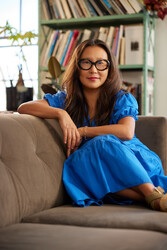 |
|
| (Photograph by Emilio Diaz @GS&P) | |
Bonnie Wan is an author and speaker, as well as partner and head of brand strategy at the world-renowned advertising agency Goodby Silverstein & Partners. As creator of The Life Brief, Bonnie helps people live with greater clarity, creativity, and courage by teaching them how to write creative briefs for their lives. The Life Brief is a practice based on her belief that "you cannot have it all, but you can have all that matters." The Life Brief has evolved from an agency talk into a workbook, workshops, and speaking appearances at Gwyneth Paltrow's Goop, Jane Goodall's Activating Hope Summit, the 3% Conference, SXSW, Bain & Company, Google, Apple, Change.org, and more. It has now evolved into the book you see before you.
The 5 Principles of Parenting: Your Essential Guide to Raising Good Humans by Aliza Pressman ($28.99, 9781668014530, January 23, 2024).
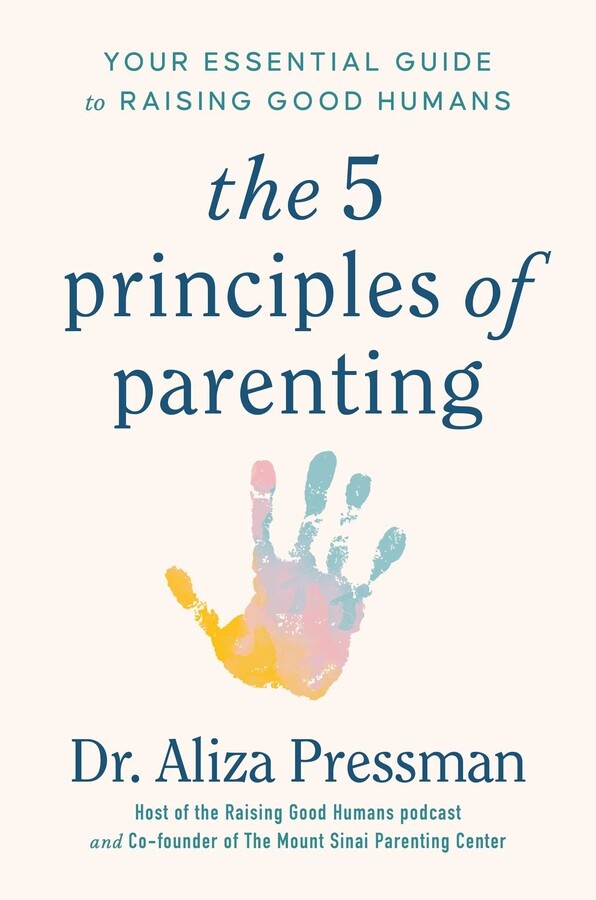 My love affair with developmental psychology started before I became a mom.
My love affair with developmental psychology started before I became a mom.
What makes us become who we are, from our earliest moments and over time? How can parents and communities best shelter the newcomers? What can go wrong? How can we heal from mistakes? I found it fascinating that there was a whole field of study exploring the answers to these questions.
Twentieth-century Swiss philosopher and psychologist Jean Piaget spent much of his professional career watching and listening to children to discover the secrets of the mind. In a thought-leap considered radical at the time, he observed that children aren't just empty vessels waiting to be filled with knowledge, but also active builders of their own education— little scientists constantly creating and testing their theories of their worlds. This made so much sense to me. As parents, we do that, too! We're not just empty vessels in need of being filled up with expert know- how. We bring all our own histories and experiences to parenting. We're parent-scientists, constantly testing strategies to see if they make our lives in our unique families' experiences easier. Through Relationships, self- and co-Regulation, Reflection, Rules, and Repairs, we become active builders of our own family dynamics.
Each of our ideas of what makes for a good human is unique. There are literally millions of ways to be a good human. As such, there are millions of ways to be a good parent. Parenting asks us to interrogate and reflect on what we think "good" means.
Developmental psychology can help.
As a developmental psychologist engaged in the science of how we get to be who we are and how we change over time, I always draw from the research. But research is dynamic; all scientific studies are con- ducted in some context, and that context isn't your unique family. Your personal experience is valuable. Your cultural and family traditions are meaningful. Some of your quirks are probably strengths unique to your situation.
Some parents read absolutely everything, and some reject "expert" advice across the board. But I've learned with all things in parenting: there's a space between—and for me, that's what this book is about. When we focus on our Relationships within our families, when we take time for Regulation and Reflection, when we're clear about Rules, and when we make a habit of Repair after mistakes, we find that space be- tween micromanagement and chaos.
Extreme ideas may seem comforting at times, like there's some way to "win" at parenting if only you and your child conduct yourselves just right. Like, Oh good, there's a clear answer. All my worries about raising a good human can be put to rest. I get that. The illusion of total certainty has incredible appeal. But as you may have already learned the hard way, extremes are unsustainable. The middle road might not seem as sexy or as black-and-white, but trust me—it's an easier road to stay on.
So much of parenting can feel like a one-and-done challenge— if we don't get attachment right with our newborns, we and they are doomed to lifetimes of feeling alienated. Not true! Research on attachment shows that attachment relationships are dynamic. And like all relationships, attachment relationships can be mended, shifted, and built upon. It's called repair, and it's one of my five principles of parenting. Not only can mistakes be met with repairs and do-overs, but these mistakes and repairs can actually strengthen our relation- ships. As you read this book, I want you to let your ears perk up when- ever we come to one of these Five Rs: Relationships, Regulation, Reflection, Rules, and Repair. The Five Rs lead to that elusive sixth R we're all hoping and building toward: Resilience.
Science can seem heady at times, but it's earthy, too. It's steady—like an old tree. Developmental psychology feels that way to me, too. It honestly boggles my mind that we don't learn about developmental psychology as a part of high school. It's completely illuminating!
Some of the old "expert" philosophies and practices have been debunked, of course. I'm not sure how the advice to start potty training babies at birth ended up in a 1932 US government pamphlet for new moms, but we clearly now know that's ridiculous. In a 1962 book, Dr. Walter Sackett recommended giving babies black coffee starting at six months old! Obviously, I don't recommend that one, either.
More recently, in the 1980s and 1990s, Dr. William Sears, a pediatrician, and coauthor Martha Sears, a registered nurse, took one of the most important words in developmental science—attachment—and applied it to their parenting approach, and they named it "attachment parenting." This confused millions of readers, suggesting that a few particular parenting practices were a method to obtain secure attachment. This isn't even remotely true, and potentially made a lot of mothers feel like failures. Attachment parenting, which is the Searses' philosophy, has nothing to do with the formation of a secure attachment relationship, a well-researched concept that is predictive of future physical, mental, and developmental health (and a buffer for the impact of toxic stress).
These days I get media requests whenever a new study or parenting influencer comes out saying this or that, whether about pacifiers, or screen time, or behavior modification. Often, I can't tell the journalists what they want to hear. I won't say that an extra hour in front of the television will ruin a kid's life, any more than I'd say giving them a cup of coffee is a good idea. Extremes make for clickable headlines. Extremes promise safety because they feel so certain. But it's a false sense of safety. The science is clear: humans don't thrive at extremes.
All this is to say that we have to be willing to reject expert advice. We have to take every study in the context in which it was done and not blindly generalize it to every family out there. But as I continued to study developmental psychology, I found it fascinating that, despite the fact we often say the new science disputes the old or we've discovered some revolutionary new insight, much of what the twentieth-century OG psychologists theorized has been held up with scientific evidence. More recently, neuroscience has affirmed much of the older wisdom from the developmental sciences on resilience. Neuroscience has also found that mindfulness, visualization, and meditation—practices once considered unscientific—should be in all our developmental and parenting tool kits. When we breathe in, we inhale the air the trees have exhaled. When we breathe out, we exhale the carbon dioxide for the trees to send to their young. The most fundamental parenting practice is something we've been doing in tandem with the trees since our ancestors came down from their branches and started walking around with two feet on the ground.
So, breathe. Doing the best we can more often than not might not seem like a super-high bar for parenting, but I'm delighted to report what the scientific research has clearly shown: if we've got the essential information and we apply it more often than we don't, that's good enough.
---
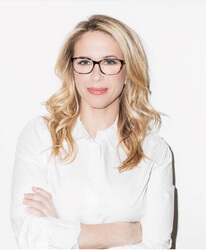 |
|
| (Photograph by Alex Phillips) | |
Dr. Aliza Pressman is a developmental psychologist with nearly two decades of experience working with families and the health care providers who care for them. Aliza is an assistant clinical professor in the Division of Behavioral Health Department of Pediatrics at the Icahn School of Medicine at Mount Sinai Hospital where she is cofounding director of The Mount Sinai Parenting Center. Aliza is also the host of the hit podcast, Raising Good Humans. She holds a BA from Dartmouth College, an MA in Risk, Resilience, and Prevention from the Department of Human Development at Teachers College and her PhD in developmental psychology from Columbia University Graduate School of Arts and Sciences. Aliza also holds a teaching certificate in mindfulness and meditation from The Greater Good Science Center at the University of California at Berkeley. Aliza is the mother of two teenagers.
JoyFull: Cook Effortlessly, Eat Freely, Live Radiantly (A Cookbook) by Radhi Devlukia-Shetty ($35, 9781982199722, February 27, 2024).
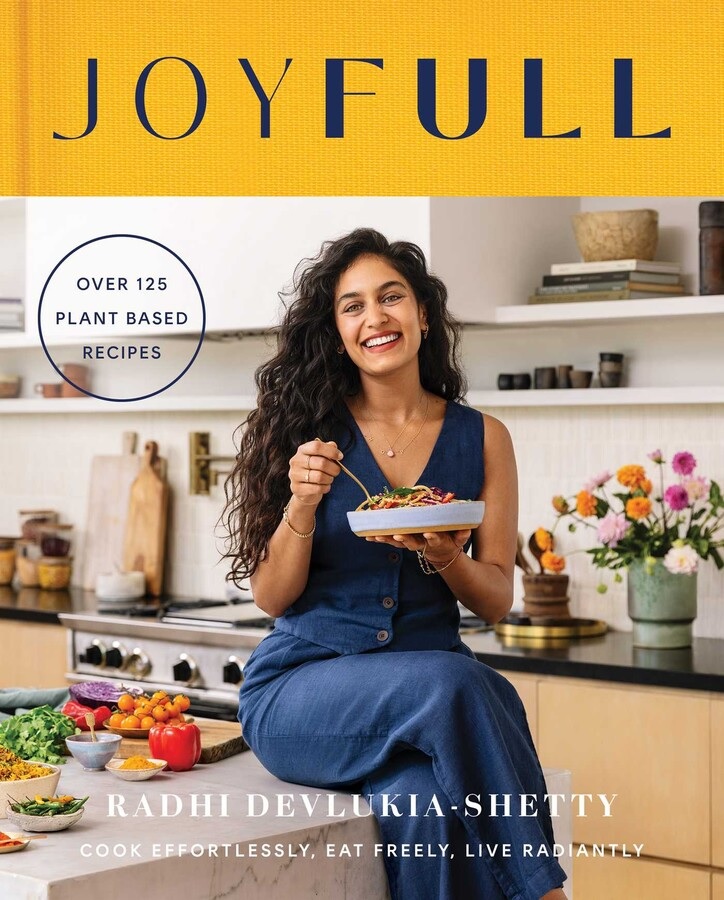 To be honest, I never, ever thought I would write a book. Until now, I had always seen myself as a perpetual student. Maybe that identity allowed me to satisfy my deep desire to learn. Or maybe it was just a good way for me to avoid imposter syndrome (or subconsciously avoid adult responsibilities!). Whatever the reason, I was—and still am—a serial seeker. That curiosity has led me to great places: I earned a degree in nutrition and dietetics; I trained as a yoga teacher; and I spent years studying Ayurveda, an ancient, though incredibly relevant, approach to mind-body wellness that has completely changed my life. I experienced firsthand how powerful these teachings are. I saw how inviting sattvic or healing plant-based foods to my plate, gratitude to my mind, and love to my heart could bring me a deeper sense of contentment and vitality. I knew that I wanted to one day help others feel it themselves, but when it came to actually being the teacher, I wasn't sure these gifts were mine to share just yet. I still saw myself as the baby of the family who followed her big sister's every move (including switching from vegetarian to vegan after she read Jonathan Safran Foer's Eating Animals), never making decisions for herself (down to the cutlery set I bought for my first flat), and generally feeling unsure of what I really had to offer.
To be honest, I never, ever thought I would write a book. Until now, I had always seen myself as a perpetual student. Maybe that identity allowed me to satisfy my deep desire to learn. Or maybe it was just a good way for me to avoid imposter syndrome (or subconsciously avoid adult responsibilities!). Whatever the reason, I was—and still am—a serial seeker. That curiosity has led me to great places: I earned a degree in nutrition and dietetics; I trained as a yoga teacher; and I spent years studying Ayurveda, an ancient, though incredibly relevant, approach to mind-body wellness that has completely changed my life. I experienced firsthand how powerful these teachings are. I saw how inviting sattvic or healing plant-based foods to my plate, gratitude to my mind, and love to my heart could bring me a deeper sense of contentment and vitality. I knew that I wanted to one day help others feel it themselves, but when it came to actually being the teacher, I wasn't sure these gifts were mine to share just yet. I still saw myself as the baby of the family who followed her big sister's every move (including switching from vegetarian to vegan after she read Jonathan Safran Foer's Eating Animals), never making decisions for herself (down to the cutlery set I bought for my first flat), and generally feeling unsure of what I really had to offer.
Then one day, my spiritual teacher, His Holiness Radhanath Swami, said this: "Knowledge is useless unless it is shared." It felt like he was telling me exactly what I needed to hear in that moment of my life. And when the Universe sends you that kind of message, you listen. In that instant, I knew what I needed to do: Stop searching for that next rabbit hole to immerse myself in (probably some sort of aromatherapy massage course) and instead find a way to put his advice into practice. I had finally realized that everything I had learned boiled down to this: What you eat—along with your daily habits and the thoughts you think—has the ability to completely transform every aspect of your health. And I wanted to be a vessel for that message.
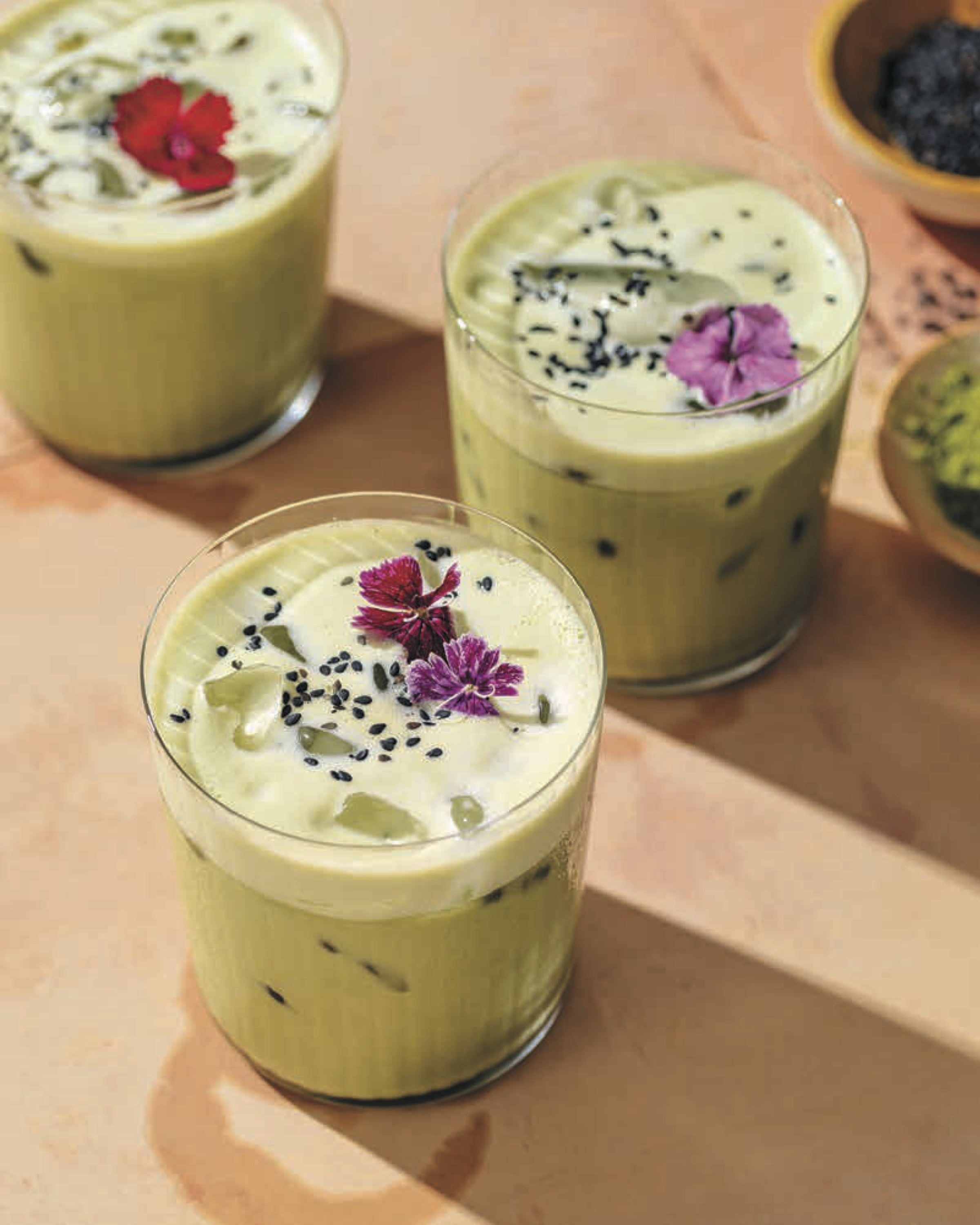 |
|
| Matcha Tahini Latte | |
Since that major aha moment six years ago, I've connected with a big, beautiful online community where I've shared plant-based recipes and Ayurveda-inspired wellness advice (plus some dance moves I was sure no one wanted to see!). Over the years, I've gotten to hear about all the ways that people have dramatically improved their sleep, naturally supercharged their energy, balanced their digestion, sharpened their focus, and felt lighter and brighter overall. I remember when I was once on a hike in LA, way up in the hills, and a woman seemingly miles below called out to me, "RADHI! I drink water the right way because of you!" (And so will you once you read this book!)
These experiences have taught me that even the smallest shift can have a big impact. Even if it's just one person I've reached, then it will have been worth it, because they, too, become a channel for that change, which then creates a beautiful chain reaction for us to elevate one another.
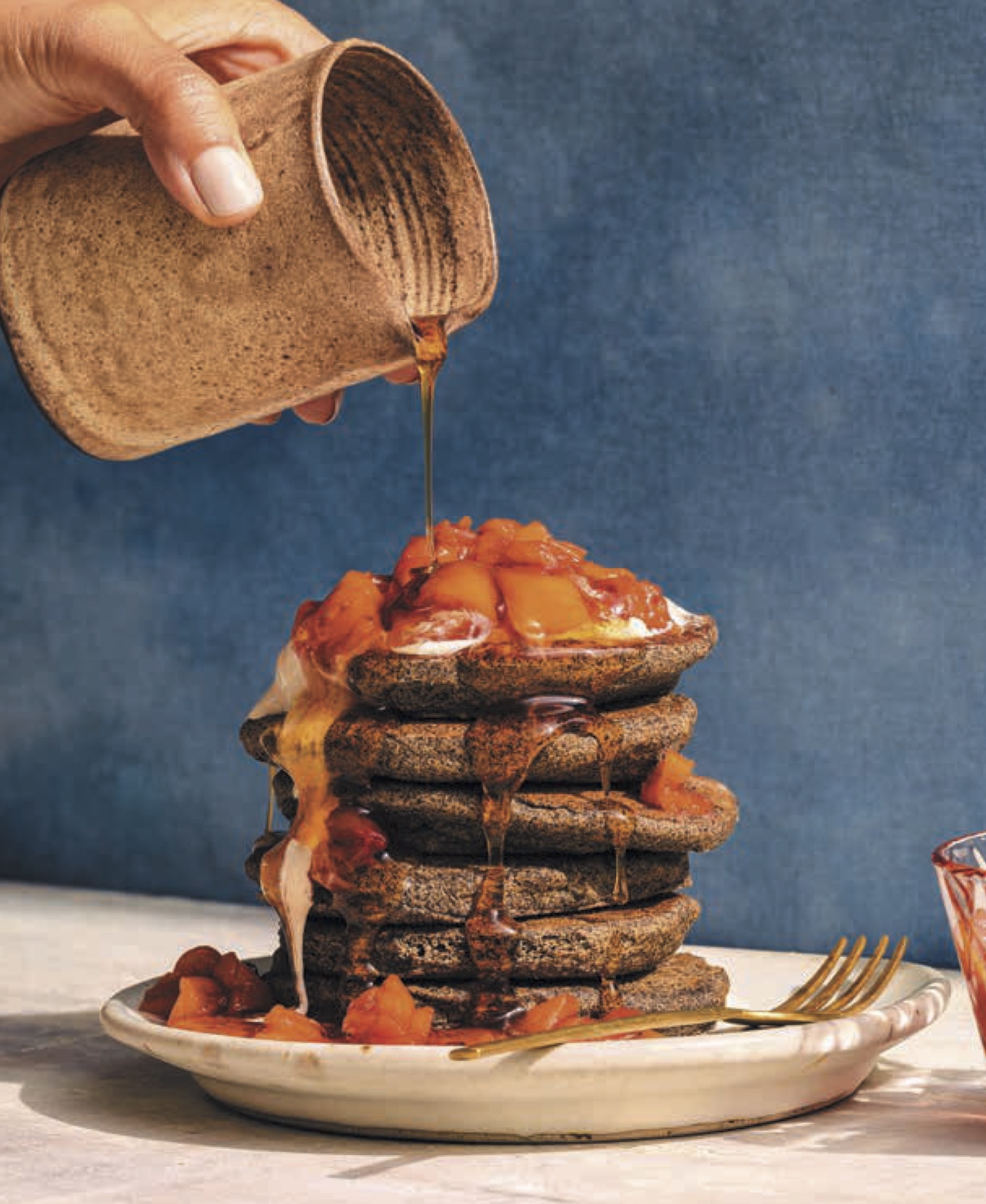 |
|
|
Buckwheat Pancakes with Compote and Sweet Cream |
|
In this book, you'll find some of my favorite recipes that I've collected and created over the years. They are just as much a reflection of my love for cooking as they are a product of my grandmothers' traditional Indian recipes, my mum's magic touch for blending different cuisines and flavors, my dad's opinions about how to make a recipe absolutely perfect (which is why he's my official taste tester), and my passion for infusing simple, seasonal ingredients with bright punches of flavor and all the saucy, creamy, crunchy condiments. They will satiate you at every meal and scratch the itch when cravings arise. No one said the road to enlightenment couldn't include a pit stop for breads and sweets!
And while we're nourishing your body with vibrant, plant-based dishes, we'll be working on getting you back into rhythm with nature. By embracing simple but powerful habits such as creating meals that balance all six essential tastes, eating with all your senses, practicing breathwork to help you transition through the phases of the day, and cooking and eating with gratitude and presence of mind, you'll be creating a strong foundation for health and vitality in body and spirit.
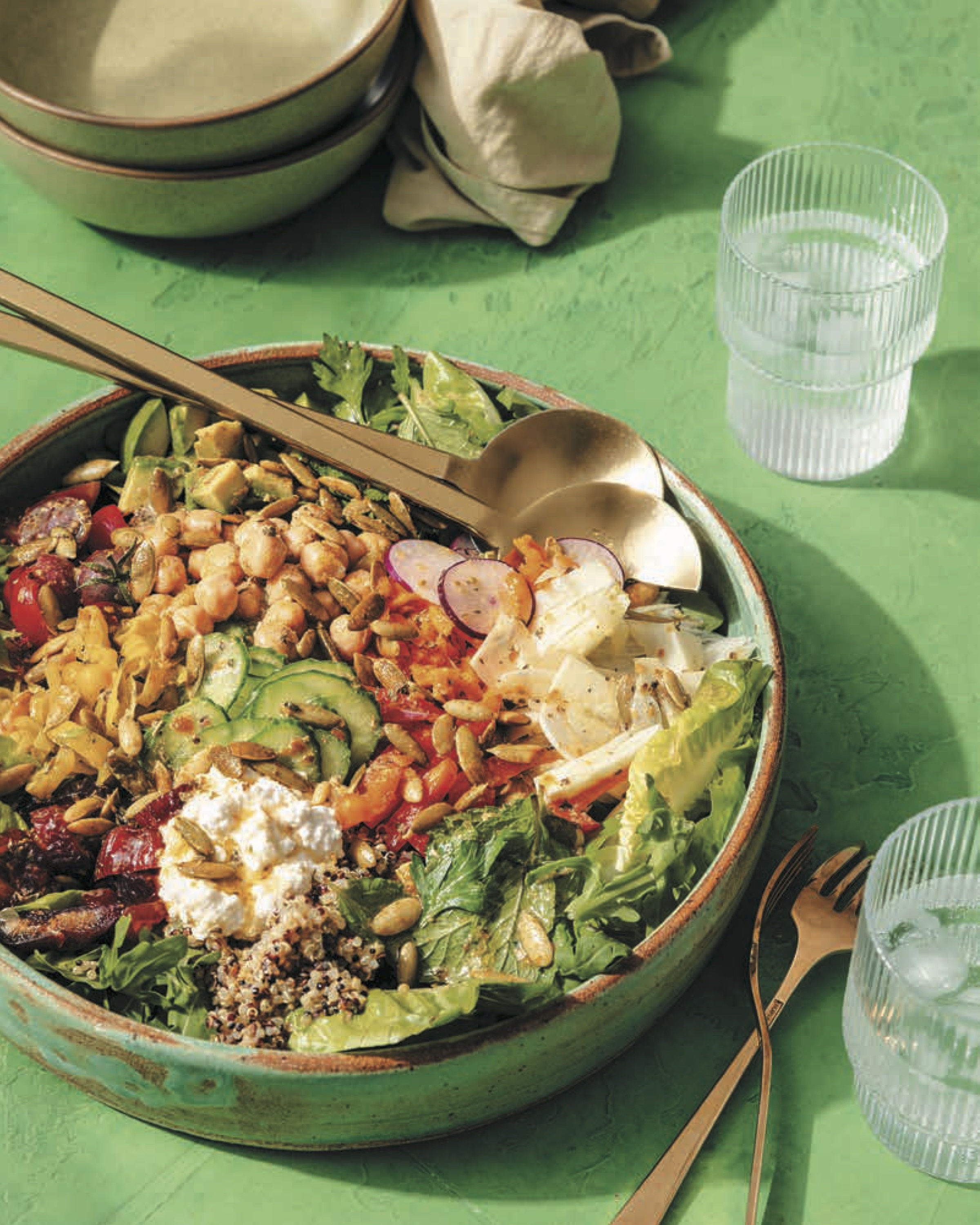 |
|
|
My Everything Packed Salad |
|
I hope this book sparks in you the same love for this conversation with nature that's brought so much of the good stuff to my life. And I hope it helps you take the next step (even if it's just a baby step!) toward nourishing yourself from the inside out. As with everything in life, the more you commit, the more benefit you will receive. It is, after all, the law of nature.
As you begin this new chapter, I'll leave you with this affirmation:
What I feed my mind, body, and soul becomes who I am, and I choose to be full of joy; I choose to be joyFULL.
---
 |
|
| (Photograph by Camryn Eakes) | |
Radhi Devlukia-Shetty is a clinical dietician, nutritionist, and always-learning cook who brings a modern approach to the ancient principles of holistic wellbeing. Radhi grew up in the UK and lives in Los Angeles with her husband, Jay.